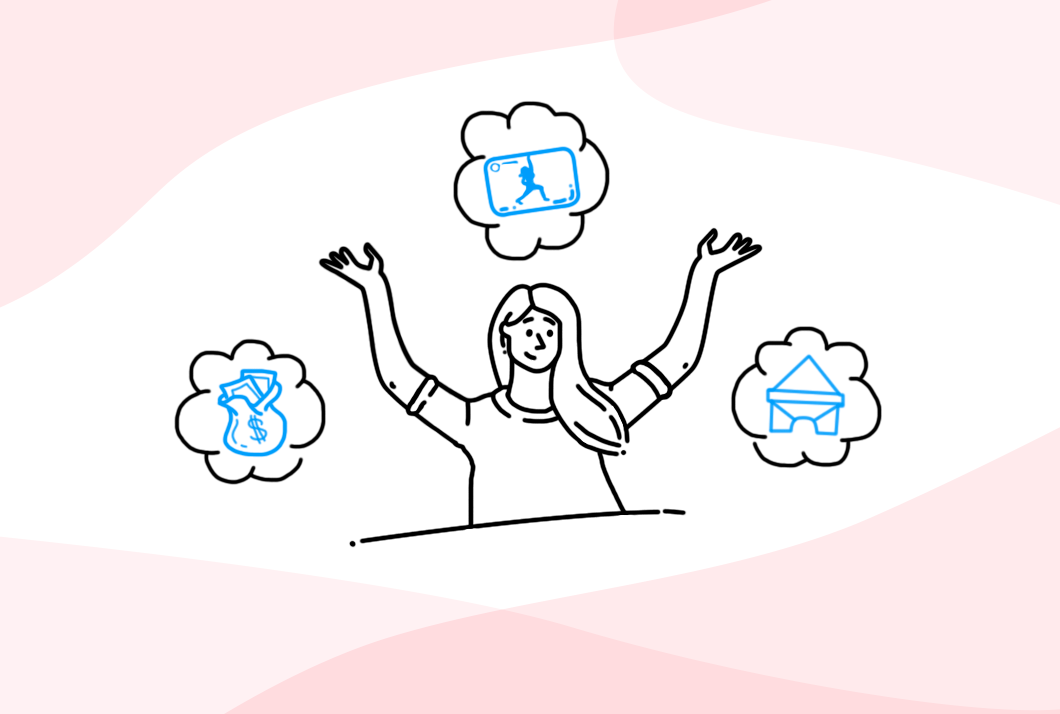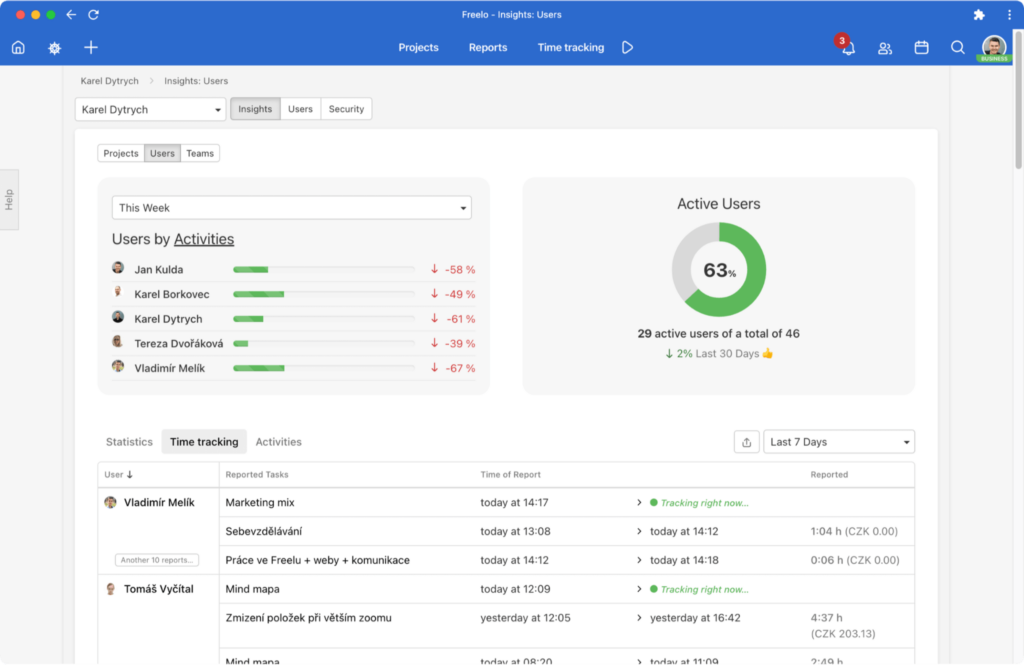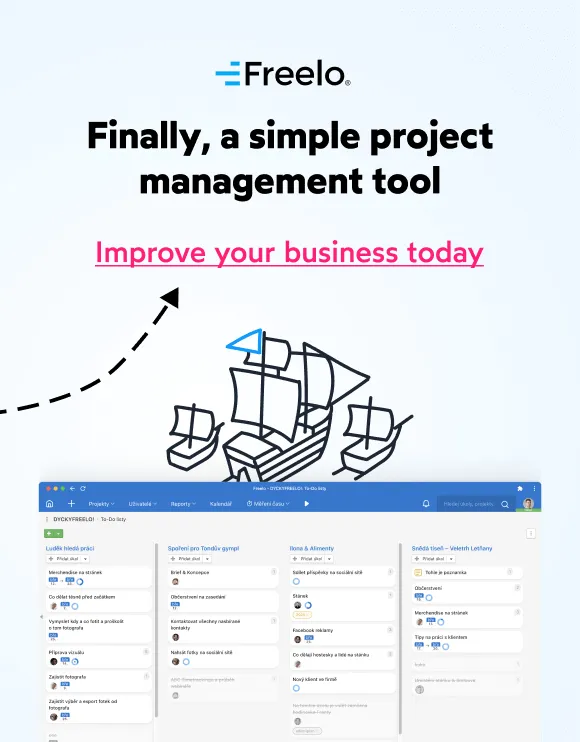Content
-
Methods of employee motivation
- Methods of material motivation of employees: wage forms
- Methods of material motivation of employees: employee perks aka benefits
- Popular and „must-have“ benefits
- Home office increases employee satisfaction
- How to control employees in the home office
- Meal vouchers and the law
- Home office and meal vouchers
- Methods of intangible motivation of employees
- What about the working climate and open space?
- Company culture
- Disability at work
- Focused on money
- Differences in the motivation of blue and white collars
- How to motivate 4 different generations in the labor market – the rise of Gen Z
- Inspiration: Feedback as part of Freelo’s corporate culture

An Overview of Employee Compensation. What Do Employees Really Care About?
 Freelo team
Freelo team

Content
-
Methods of employee motivation
- Methods of material motivation of employees: wage forms
- Methods of material motivation of employees: employee perks aka benefits
- Popular and „must-have“ benefits
- Home office increases employee satisfaction
- How to control employees in the home office
- Meal vouchers and the law
- Home office and meal vouchers
- Methods of intangible motivation of employees
- What about the working climate and open space?
- Company culture
- Disability at work
- Focused on money
- Differences in the motivation of blue and white collars
- How to motivate 4 different generations in the labor market – the rise of Gen Z
- Inspiration: Feedback as part of Freelo’s corporate culture
Nearly two-thirds of U.S. workers quit their jobs in 2021 because of low pay. According to the LMC, the feeling of being undervalued is also a major reason for job dissatisfaction in the Czech Republic. However, pay is not the only way to value employees. Sometimes „simple“ praise is enough. Or a whole arsenal of motivational means. Do you know them all?
Methods of employee motivation
As indicated in the introduction, motivation methods are divided into tangible (e.g., pay) and intangible (e.g. praise). A truly effective combination of the two will reflect the needs of the employee and their motivational profile – this can be revealed, for example, through personality tests. You certainly won’t go wrong if you recall motivation theory in practical form.

Methods of material motivation of employees: wage forms
- Time wage or a fixed amount per hour, week or month. It is the least motivating of all forms of pay because it does not depend on how hard an employee works in a given amount of time. It is therefore usually supplemented by a performance
- Task wages are typical of blue-collar occupations because they are paid according to the completion of partial tasks. The quality of the work done must be incorporated into the evaluation so that quality does not suffer in the pursuit of higher earnings. Task pricing is not limited to manual occupations. The hourly rate, or „hourly rate“, is also used by copywriters, SEO specialists, graphic designers and other „modern“ professions.
- The share wage (commission) is directly related to the quantity sold, so it is most often applied in service and commercial activities. However, it should be indexed to a long-term trend so that it is not affected by factors not attributable to the employee, such as seasonality, advertising,
- Fringe benefits are items in addition to wages. Some are compulsory by law (for working on public holidays or at night). Others are voluntary, e.g., for clothing or transport.
- Bonuses can be monetary or non-monetary. It is, for example, a special award for exceptional performance or a celebration of a work anniversary. They strengthen loyalty to the
- Personal remuneration is calculated as a percentage of salary according to the employee’s long-term performance. It is usually based on the progress of the appraisal interview.
- Other payments, such as the 13th salary
- Profit and loss shares. As part of the contract, employees may be promised a percentage of the company’s

- Employee shares, i.e., the opportunity to buy company shares at discounted prices, are offered to employees mainly by large public companies, such as
Shares and profit sharing are mainly for middle and senior management. In theory, all employees can have access to them without distinction. Thanks to share pay (and a bit of chance), a few people have become fabulously wealthy. For example, painter David Choe painted the offices of a start-up company in exchange for shares. The company turned into Facebook. And David became a dollar multimillionaire.
Current topic: What is an ESOP (Employee Stock Option Plan)
When we talk about employee stock, we can’t leave out the ESOP, or Employee Stock Option Plan. Simply put, it is a form of employee stock option plan that is quite common in the US and the UK. However, in mainland Europe, it has little support in law and, in the Czech Republic in particular, the situation is poor. Yet they are used and promoted by a number of companies, including Rohlik and Etnetera.
ESOPs are particularly interesting for start-ups because they:
1. Attract the best talent
Wages in start-ups cannot compete with large companies, especially in the technology or banking sectors. That is why start-ups reach for ESOPs, which make up for the wages, albeit with some risk.
2. Retain employees
ESOPs have a vesting period, during which the employee only acquires rights to them. This period motivates the employee not to leave the company early.
3. Motivate to better performance
Through ESOPs, employees become co-owners and gain decision-making rights. This gives them a greater stake in the bottom line. They also take on a certain amount of risk, which reinforces the feeling that they are all in the same boat. ⛵
Methods of material motivation of employees: employee perks aka benefits
Benefits increase the attractiveness of the job and improve the reputation of the employer. They are not linked to job performance, as they are part of the care of the workers.
- Job-related employee benefits create pleasant working conditions. These include, for example, refreshments at the workplace, training beyond what is necessary (language courses, conferences), transport to work.
- Tangible equipment and work tools that are also used for personal use. These are usually cars, computers, telephones and fuel
- Employee benefits of a personal and social nature include allowances for holidays, culture and sports, contributions to building savings, insurance and supplementary insurance, gifts or gift vouchers for special occasions and the offer of products at discounted
Companies like to distribute these benefits through the so-called cafeteria system. Employees have access to an imaginary marketplace from which they can choose rewards according to their own taste according to predefined rules.
Popular and „must-have“ benefits
- MultiSport card: From an analysis of job advertisements, it seems that the multisport card has become an evergreen, without which you can’t hire anyone. On the other hand, start-ups (and not only them) like to define themselves against.
A sports allowance does not automatically equal a gym membership. At Freelo, the captains have taken a different approach, again in the spirit of personal freedom and responsibility – an hour devoted to sport counts as time worked. Up to 3 times a week.
In practice, this means that on the chosen day you work only 7 hours and play sports for an hour at will. It doesn’t matter if you cycle, run, swim, do yoga or actually go to the gym.
Sometimes we combine it with a team activity and go play beach volleyball, for example.

- The home office is increasingly in demand. This is also proven by the fact that job portals have introduced a filter relating to working from home directly into the basic job
Home office increases employee satisfaction
Employees with the option to work from home are 20 percentage points more satisfied than those without the option. Especially since it became clear during the pandemic that telecommuting can be arranged in places where it would not have been attempted before.
Why people want a home office:
- Ability to focus on more complex tasks. Marketeers typically take home the preparation of more challenging reports because they can’t focus on it in the hustle and bustle of the
- A better combination of family life and work. According to the amendment to the Labor Code, which adapts the European Directive 2019/1158, people caring for young children or dependents should now even be legally entitled to a home
- Getting more effective practice at studying, perhaps by working in the spare blocks between lectures or on the
- Commuting is eliminated, which saves both time and
While programmers are known to prefer full remote, other professions prefer a combination of working from home and the office.
Opinion HR
People Business Partner Silvie Kaderka confirms that working from home is a big topic at Bonami. „Overall, the company supports hybrid/remote working. On average, employees work 2 days from home and 3 days in the office. Each team has set its own rules for working from home, depending on the nature of the work and the way of cooperation. The general rule is that all team members should meet in the office at least once a month.“
How to control employees in the home office
No way. It’s humiliating for both sides. If you don’t trust people, they won’t want to take responsibility. Why would they try if you don’t trust them anyway?
Every control mechanism can be tricked. When monitoring computer activity, an employee ties a mouse to a pet or robotic vacuum cleaner, and it immediately appears to be active. The Internet is full of tricks like this.
It’s easier at home, but employees can also lie in the office. Slackers praise the tactic of walking quickly down the halls with a folder and looking busy while actually doing nothing.
But the lack of control doesn’t mean you’re going to let it become a pigeonhole. Use the project tool. Use it to communicate, delegate tasks and maintain company processes.
👉 Check out our blog article for more.

You can tell who is working by the results. If they’re not satisfactory, you deal with it on an individual basis.

💡You know, right?
Although Home Office is a combination of English words, people outside Central Europe won’t understand it? The correct term in English is work from home or work remotely. In the past, English speakers also used the term teleworking, but it has almost disappeared.
- Meal vouchers are another favorite, nowadays more in the form of a meal card than physical paper. Subsidized factory meals are just a slightly different form of the same benefit.
Meal vouchers and the law
The employer does not have to provide meals, so you will not find anything about meal vouchers in the Labor Code. What you will find, however, is that the employer must provide meals – the compulsory meal and rest break is 30 minutes after 6 hours of continuous work.
Therefore, meal allowances (who is entitled to them and when) are governed only by the employer’s internal regulations. As a rule, these regulations are inspired by the Income Tax Act, as meal vouchers are exempt from income tax under certain circumstances defined by this Act. They are also tax deductible as an expense under certain conditions.
Home office and meal vouchers
When two of the most popular benefits are combined, complications arise. In order for meal vouchers to be tax deductible as an expense, the employee must have clear working hours, which is often not the case at a home office.
Whether a homeworker gets a meal voucher depends on the employer and its internal regulations, as it is a benefit. If the employee receives a meal voucher, it is always exempt income without any other conditions.
For an employer to claim a meal voucher as a tax-deductible expense, 3 conditions must be met:
- The employee performs work at a workplace as directed by the employer. (This location may be the home )
- The employee’s working hours are pre-scheduled into shifts (i.e., the working hours are set by the employer).
- The employee performs work during the scheduled shift for at least 3 hours or is at least on duty at the workplace during that time as directed by the
It follows that if the employee determines his or her own working hours, meal vouchers are not tax deductible as an expense for the employer.
Opinion of HR
Silvie Kaderka, People Business Partner at Bonami, confirms that the Multisport card is in high demand among the company’s employees, which is why they have included it in their offer. She is not so sure about the motivational role of the meal vouchers and the meal allowance because she believes that people will soon stop noticing the amount of money spent on meals and take it for granted.

Methods of intangible motivation of employees
Intangible motivation tools are harder to define and grasp. They are the working conditions that make up the work team, the way work is assigned and feedback, training and the provision of further development. Again, the individual’s needs must be taken into account.

- Employee selection is key to success. In the selection process, attention must be paid to skills that cannot be acquired on the job, such as empathy. Be wary of inappropriate character traits such as conflict seeking and inability to cooperate. On the other hand, what is undesirable in one company may be ideal for another, such as high competitiveness or assertiveness. How a candidate fits in with the team and the company as a whole is called culture fit in HR
- Employee training is the best prevention of later mistakes. Two-way communication between trainer and employee during the process is important. The trainer needs to be sure the employee understands the assignment and should not assume prior knowledge of the procedures unless he or she has verified it. The employee should be involved in the development of the assignment and be given the opportunity to comment if he/she doubts its feasibility. If mistakes are made during training, this is likely to have a negative impact on the employee’s
- Feedback can be unpleasant, yet three-quarters of employees understand that it is beneficial. And 65% of employees would like to receive it more often. For how to make feedback work, check out this separate article.
- Delegation is divided into hard and soft. In terms of motivation, the latter works better. The supervisor delegates only the goal, not the specific processing. The employee comes up with that
- Work climate is a very broad term that covers a lot of things. For example, workplace relations, shift planning, lighting, temperature, availability of food and work equipment… Every company will deal with something a little different. Your employees can best tell you what to address in your
What about the working climate and open space?
Unfortunately, open space affects the working climate rather negatively, because in many people it is difficult to agree on ventilation, air temperature and not to disturb each other. In addition, you can be seen from everywhere, which is not pleasant (you have the feeling that someone is watching you). Overall, the open space makes it harder to concentrate.
It has advantages, of course. Whole teams are together, so it’s easier to pass information. The boss can find everyone easily and really has everyone under control.
Recently, companies have been moving away from giant open spaces and separating spaces for smaller teams of people.
Company culture
- Staff development is necessary not only for job performance, but also for the feeling that they are getting somewhere. This is linked to the opportunity for career growth.
- Identification with the work and the organization will contribute to making the work part of the person. A well-set and communicated company identity and image will attract like-minded employees. Motivation is enhanced by clear and understandable goals with which the employee is
Unusual benefits
- Extra paid leave for new dads: the paternity allowance, known as paternity leave, is a statutory entitlement. However, some employers go one step further and give new parents more time to adjust. Nestlé, for example, gives 4 weeks of paid leave to the parent who does not stay at home, both at the birth of a biological child and at adoption; Vodafone gives fathers 16 weeks of extra paid leave.
- Women have days off for menstruation quite officially in Spain, for example. They are not yet available in the Czech Republic, although some companies have already tested them. So far, there are fears that they would end up putting women at a disadvantage on the labor market. That is why women prefer traditional sick
- Unlimited holidays are for example in Rohlik or Avast. However, in reality, people choose only a few days more than the usual 25 days.
- Massage, physiotherapy: sedentary jobs need to be compensated for, so in addition to sports, some companies offer massages or exercises with a physio or occupational therapist.
- Hairdressing and beauty services: offered by employers of companies that are in the industry. For example, L’Oréal.
Employee Opinion
Václav Hřivna, Senior GL Accountant at Keyloop, especially enjoys the free summer Fridays and other optional Picknic Days (days off in summer), which compensate for the more demanding days in the closing season. She also appreciates the extra benefit points as a birthday gift
Disability at work
Since the time of Bismarck, the sugar and whip method has enjoyed great popularity. However, in the new millennium, more liberal trends in child rearing and employee motivation are coming, and many psychologists, coaches and HR experts are advising against this method. While sugar and whip may work in the short term for routine, uncomplicated tasks, in the long run it blocks intrinsic motivation, the importance of which permeates this entire article.
Bonuses vs. malus in the workplace
They are not as clear-cut as for compulsory car insurance. Be very careful before you take any penalties.
Reduction of wages (removal of the non-merit component of wages)
The employer cannot reduce the wage as such, even if the employee is in breach of duty. For this reason, the wage is divided into a fixed and a non-remuneration component, as the non- remuneration component is not logically entitled to it. Even so, it is not simple.
The non-reward component of pay can only be reduced for poor performance (not for breaches of duties such as alcohol in the workplace or late arrivals). Underperformance must be demonstrable; the tasks must be realistic, and the performance must be worse than that of other employees.
The employee must be informed of the withdrawal of bonuses or other non-rewarding benefits before the start of the work period in which the withdrawal of bonuses will be applied.
Deductions from wages
Please note that deductions from wages are not a penalty but are payments to third parties. They can be voluntary, e.g., for the use of a company flat or for a multisport. But they can also be involuntary, such as child support.
Reduction of leave
Leave may be reduced in the case of unexcused absences. The time when the employee has not been at work is deducted from the leave. However, two weeks must remain. Leave is also reduced for sick leave.
Reduction of sick leave
If an employee breaches the temporary disability scheme (TDS), they may have their sick pay reduced or be dismissed for breach of duty.
Letter of reprimand
If an employee violates the employer’s rules, he or she may receive a letter of reprimand specifying the violation. For 3 violations, he or she may also receive a termination letter as outlined below.

Termination for breach of employment duties (formerly discipline)
- Consistent minor violations – must have occurred at least 3 times in the last 6 months (does not have to be the same offense) and the employee must receive a letter of reprimand with a specific list of situations.
- Serious misconduct – this is, for example, unexcused absence or failure to follow the employer’s instructions. And breaches of the temporary sickness absence regime, see above.
- A particularly gross violation – this is, for example, physical assault, assault on property (according to case law, it does not depend on the value of the property). What is essential is that there is a breach of trust that cannot be restored. In this case, immediate termination of employment is also possible.
Immediate termination of employment
In addition to a particularly serious breach of work duties, it is also possible if the employee is convicted of a deliberate crime for 1 year or more.
The ban on double punishment at work does not apply
The Czech legal system applies the principle that the same case cannot be decided twice – Ne bis in idem. However, this does not apply in the workplace. The only exception is a breach of the DPN regime, where an employee can either be dismissed or have his sick pay reduced, but not both.
Focused on money
Money in itself has no value. We assign value to it. We are motivated by the vision of what needs we will satisfy with money. For this reason, an employee may not care whether he or she receives the money directly on his or her paycheck or in the form of an allotment or voucher. But only if he or she actually needs the item or service that the voucher will buy.

Giving a person who hates the heat a voucher for a sauna is more of a mockery than a reward. On the other hand, for a sauna lover, a voucher worth CZK 1,000 and a thousand in the bank may be worth the same.
Tax benefits for benefits
Vouchers for sports and culture are tax and insurance-free for employees, so they are more advantageous than „cash“, even though they are a tax-deductible expense for employers.
However, be careful not to pay for something that the employee will not use, i.e., it does not motivate them in any way.
How money affects motivation
In a meta-analysis by Tim Judge and colleagues, there appeared to be little association between job satisfaction and pay. And this association is very similarly low in all corners of the globe – it is not significantly different in the US, India, Australia or Taiwan. On the contrary, it seems that money can be demotivating because it takes away a person’s intrinsic motivation to work on themselves and improve, but the studies are not entirely clear on this. What they did agree on was that the main demotivator is a bad manager.
Money versus leisure
Workers exchange their free time for wages, i.e., work. And there is definitely a limit to how much free time they are willing to exchange. It is certainly not the case that more money is the solution to everything.
Money versus life stages
At the beginning of adult life, people have very similar material aspirations, but these change over time as income increases. In early adulthood, people with higher incomes are actually happier because they are better able to meet their needs. Later in life, however, the link no longer holds, as material needs grow in proportion to income. Since the increase in material needs is not expected by the person, the desired increase in utility does not occur after the increase in income. (2001, Easterlin). After a significant improvement in status, a person feels happier for at most a year. (2010, di Teila).
Differences in the motivation of blue and white collars
Kaderka sees a big difference between employees on the shop floor and in the office. „The blue-collar professions are definitely more sensitive to money. They are motivated by every extra crown and will leave if they are offered 500 CZK a month more elsewhere. In the office, money is not talked about so directly, but of course it is also very important.“
„The operation appreciates a good boss, praise, decent premises and facilities. They value team building and events far more because they are more precious to them. But they also hear praise and appreciation in the office.“ Kaderka confirms that feeling unappreciated as a reason for leaving on the front lines.
Belonging to the company as a motivating factor, on the other hand, applies mainly to white-collar workers. During interviews, they often say what kind of company they would not like to work for, what products they do not want to promote, etc. For blue-collar workers, various employers are very close substitutes and what philosophy the company professes or what it produces is not important to them.
HR opinion
„Although the motivation of people in production and in the office has its own specifics, free or heavily discounted products are positively accepted by both groups,“ confirms Petra Hřivnová, former HR benefits specialist at Coca Cola Hellenic. Specifically, each employee is entitled to 3 packages of 6 bottles of soft drinks (Coca Cola, Fanta, water…). They get a significant discount on others, including alcoholic ones
How to motivate 4 different generations in the labor market – the rise of Gen Z
The following 4 generations meet in the labor market. We certainly do not want to generalize that all people born within 20 years are the same. But each generation has been shaped by similar circumstances, so that approximate age can serve as a guide to motivation.
There is one more thing to watch out for with baby boomers and Gen X. Most of the research is done in the U.S., and while many of the influences are global, each side of the Iron Curtain shapes future employees differently. Moreover, these generations have raised millennials, so even if Eastern European millennials have experienced socialism from a pram at most, some vestiges are visible. Hopefully, globalization and freedom have fully seeped into Gen Z.
| Generations | Birth years | Main motivator |
| Baby boomers | 1946 to 1964 | Flexibility |
| Generation X | 1965 to 1980 | Independence |
| Generation Y (millennials) | 1981 to 1996 | Development |
| Generation Z | 1997 to 2012 | Sense |
What motivates Gen Z
Don’t think of Generation Z as spoiled teenagers on Tik Tok. The oldest of them are celebrating their 25th birthday this year, becoming parents, and will make up a quarter of the workforce in 3 years. Contributing to this is the fact that they are more likely than millennials not to go to college, so they are entering full-time work at a younger age.
Generation Z no longer remembers a world without the internet. They are true internet natives. Technology is intrinsic to their lives – 61% of them say they prefer face-to-face communication. But they also consider Zoom with video.
They’re used to immediate feedback, and they want it. Definitely don’t count on feedback once a year.
They care about inclusion and an accepting culture, which plays a role in the companies they choose to work for. They also have more entrepreneurial spirit compared to millennials. They don’t want the classic 9 to 5, but they want the flexibility and ability to work from home, which they expect owning their own business to guarantee.
At the same time, however, they emphasize stability and in this they agree with the baby boomers. They remember well how their parents struggled during the 2008 financial crisis. Unlike millennials, they are not raised to believe that things will only ever get better.

Age and family situation affect motivation
We don’t mean to ask about age and family situation at the interview. These are discriminatory questions that must not be asked during recruitment.
However, once the employee starts, you are likely to learn this information. Either in a formal way – they’ll fill in the date of birth on the contract, report the children for tax credits, or in an informal way, perhaps when you have a chat over lunch.
We do not want to generalize on this topic because it is too complex. Therefore, we will just sketch a few rewards that might be more interesting at a certain stage of life than at another.
Contribution to pension and life insurance
These are very popular and especially convenient benefits because:
- They are tax deductible and, to a certain extent, exempt from levies.
- The state also contributes to the supplementary pension (up to CZK 230 per month for a minimum deposit of CZK 1 000 in 2024).
- They reduce the tax
This makes them significantly cheaper for employers than a gross wage increase.
Many employees will indeed appreciate them, but 20-somethings just out of college, with no family and 40 years left until retirement probably won’t. Consider offering them other, more relevant benefits.
💡 Tip
Ask employees what they are really interested in. Include it in 1-to-1 feedback or send out a survey.
Benefits for parents
Employment of parents, especially mothers, is a tricky issue. There are fears of absenteeism, lack of focus and disengagement from the working regime. On the other hand, parents, again especially mothers, of young children are trained in multitasking and mental resilience. As the successful working-mom companies M.arter or Mumdoo show, parents of young children want to work. And given the (not only financial) responsibility for their other lives, they tend to be more loyal employees.
That’s why some companies prepare benefits specifically for parents. For example, Česká spořitelna provides membership to the Hlídačky.cz portal, which arranges babysitting, pet sitting and household cleaning. In addition, parents returning from parental leave receive a childcare allowance.
Opinion HR
Tereza Skrbková, Corporate Communication Manager at Nestlé, says: „Nestlé has expanded the range of employee benefits for new parents from January 2022. The employee who stays at home after the birth or adoption of a child and takes care of it, Nestlé will pay the difference between the social benefit (maternity allowance) and the gross wage for 18 weeks. On the other hand, Nestlé provides 4 weeks of paid leave to an employee who does not stay at home with the child after the birth or adoption and returns to work. The benefit applies to all Nestlé employees in the Czech Republic and Slovakia, whether they work in one of our four plants, at headquarters or in the field. At the same time, same-sex couples can also take advantage of the benefit. With this new employee benefit, Nestlé wants to help all parents who welcome new additions to their families and support them through life changes.“
„Nestlé also offers other benefits to support parents. For example, when the situation allows, employees have the option of working flexible hours while on parental leave or have access to an updated practical guide for new and expectant parents. This gives them a clear overview of everything they need to know and arrange to make this major life change as smooth and simple as possible, without having to do complicated research. Parents of children who have reached the age of 6 months also receive a monthly allowance for baby food products,“ adds Skrbková.
Benefits for 55+ year old
Older age brings benefits in the form of greater experience and life perspective, but often health begins to fail. That’s why some companies offer enhanced preventive medical care for these employees.
Home office and flexibility for all
If for some reason you can’t offer a portfolio of benefits tailored to your age and life situation. Home office and free working hours won’t make you miss out on any generation. See chapter Home office increases employee satisfaction.
Inspiration: Feedback as part of Freelo’s corporate culture
1-to-1 retrospective
Once a month, each sailor reviews the past period with his captain.
During the retrospective, the captain directly writes notes that are shared only with the other captains, otherwise they remain secret.
In order to build healthy working relationships, we have integrated regular individual and team feedback into the company culture.
Team retrospective
Once a quarter, the whole team gets together and uses green and red sticky notes to tell each other what works and what doesn’t.

The pinki papers represent negative issues. We discuss them and when we come up with a solution, we create a task in Freelo with a deadline and a specific solver. Green papers represent praise.
„Lighthouse“ catch up 🚨
Once a month, we get together, have a snack, coffee or tea and share what we’ve been interested in (podcasts, apps, exercises…), what the Underdeck lives for and what we’ve managed to do.
Freelo bird 🦜
To make sure that we don’t forget to share the joys of everyday life, even when we don’t meet on deck, we have created a chatbot called Freelo the Bird. (What would a captain be without his parrot?). Every day he asks us on Slack what we’ve been up to. Once a week he checks to see if we’re moving enough and reminds us to practice our English on English Wednesdays.
A note at the very end: Although in the article you read terms from labor law such as employee, supervisor, wage, etc., it does not mean that in principle it is not possible to operate similarly in business relationships on the basis of supplier and client.
 Freelo team
Freelo team





